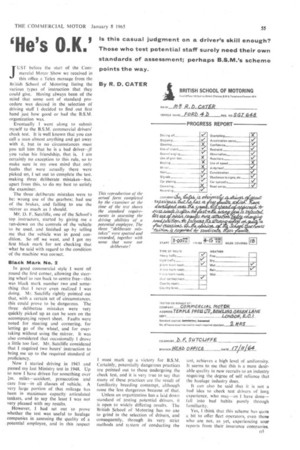'He's O.K.'
Page 57

If you've noticed an error in this article please click here to report it so we can fix it.
Is this casual judgment on a driver's skill enough? Those who test potential staff surely need their own standards of assessment; perhaps B.S.M.'s scheme points the way.
By R. D. CATER
iiUS F before the start of the Commercial Motor Show we received in this office a Telex message from the Br:tish School of Motoring listing the various types of instruction that they could give. Having always been of the mind that some sort of standard procedure was desired in the selection of driving staff I decided to find out first hand just how good or bad the B.S.M. organization was.
Eventually I went along to submit myself to the B.S.M. commercial drivers' check teSt. It is well known that you can call a man almost anything and get away with it, but in no circumstances must you tell him that he is a bad driver—if you value his friendship, that is. I am certainly no exception to this rule, so to make sure in my own mind that only faults that were actually there were picked up, I set out to complete the test, making three deliberate mistakes—but. apart from this, to do my best to satisfy the examiner.
The three deliberate mistakes were to be: wrong use of the gearbox: bad use of the brakes, and failing to use the mirror as much as I should.
Mt. D. F. Sutcliffe, one of the School's top instructors, started by giving me a run-down on the controls of the vehicle to be used, and finished up by telling me that the vehicle was in good condition. So off we went, and I got my first black mark for not checking that • what he said with regard to the condition of the machine was correct.
Black Mark No. 2
In good commercial style I went off round the first corner, allowing the steering wheel to run back to centre free—this was black mark number two and something that I never even realized I was doing. Mr. Sutcliffe rightly pointed out that, with a certain set of circumstances, this could prove to be dangerous. The three deliberate mistakes were very quickly picked up as can be seen on the accompanying report sheet. Faults were noted for steering and cornering, for letting go of the wheel, and for overtaking without using the mirror. It was also considered that occasionally I drove a little too fast. Mr. Sutcliffe considered that I required two hours' instruction to bring me up to the required standard of proficiency.
Now I started driving in 1943 and passed my last Ministry test in 1948. Up to now I have driven for something over lin. miles—accident, prosecution and care free--in all classes of vehicle. A very large portion of that mileage has been in maximum capacity articulated tankers, and to say the least I was not very pleased with my results.
However, I had set out to prove whether the test was useful to haulage companies in assessing the quality of a potential employee, and in this respect must mark up a victory for B.S.M. Certainly, potentially dangerous practices are pointed out to those undergoing the check test, and it is very true to say that many of these practices are the result of familiarity breeding contempt, although none the less dangerous because of that.
Unless an organization has a laid down standard of testing potential drivers, it is open to widely differing results. The British School of Motoring has no axe to grind in the selection of drivers, and consequently, through its very strict methods and system of conducting the
test, achieves a high level of uniformity. It seems to me that this is a most desirable quality in new recruits to an industry requiring the degree of self reliance that the haulage industry does.
It can also be said that it is not a bad idea to check test drivers of tong experience, who may—as I have done— fall into bad habits purely through familiarity.
Yes, I think that this scheme has quite a bit to offer fleet operators, even those who are not,. as yet, experiencing sour reports from their insurance companies.




















































































































